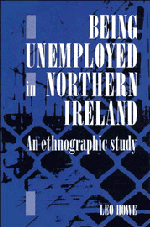Book contents
- Frontmatter
- Contents
- List of tables
- Acknowledgements
- List of abbreviations
- 1 Introduction
- 2 The political economy of Northern Ireland and the anthropology of sectarianism
- 3 Doing the double in Belfast: the general picture
- 4 Doing the double or doing without
- 5 The ‘deserving’ and the ‘undeserving’: administrative practice in a social security office
- 6 Claimants and the claiming process: the reluctant claimant
- 7 Claimants and the claiming process: the assertive claimant
- 8 The employed and the unemployed: conflict, discourse, and ideology
- 9 Conclusion
- Notes
- List of references
- Index
4 - Doing the double or doing without
Published online by Cambridge University Press: 04 May 2010
- Frontmatter
- Contents
- List of tables
- Acknowledgements
- List of abbreviations
- 1 Introduction
- 2 The political economy of Northern Ireland and the anthropology of sectarianism
- 3 Doing the double in Belfast: the general picture
- 4 Doing the double or doing without
- 5 The ‘deserving’ and the ‘undeserving’: administrative practice in a social security office
- 6 Claimants and the claiming process: the reluctant claimant
- 7 Claimants and the claiming process: the assertive claimant
- 8 The employed and the unemployed: conflict, discourse, and ideology
- 9 Conclusion
- Notes
- List of references
- Index
Summary
Introduction
Since they were not designed to collect such information many surveys of the unemployed (Hill et al., 1973; Daniel, 1974, 1981; White, 1984) have little to report on those working for undeclared income and claiming benefits. Data contained in other works are also rather sketchy. Morris argues that in Port Talbot ‘occasional work for undeclared income was relatively common’ (1984b: 349; her italics), and that the incidence of such work correlates with patterns of social activity, those with dispersed or collective patterns of social contact being involved more than those with an individualistic pattern. Elsewhere (Morris, 1984a) she records that such additional sources of income tend to reinforce gender roles. Bostyn and Wight, working in Cauldmoss, Scotland, found that irregular work on the side is quite common, that it is not described significantly differently from legitimate work, and that obtaining it depends on social contacts, especially kin (1984: 61–4; cf. Turner et al., 1985). Perhaps the best description available is still that provided by Marsden. According to him ‘fiddling’ generally starts when unemployed people have exhausted legitimate options and when financial and other pressures begin to escalate within the home. Work on the side removes the man from the house, furnishes constructive activity, and puts money in his pocket. On the debit side, such work is informally controlled by locals unwilling to see anyone do too well out of it.
- Type
- Chapter
- Information
- Being Unemployed in Northern IrelandAn Ethnographic Study, pp. 77 - 105Publisher: Cambridge University PressPrint publication year: 1990

